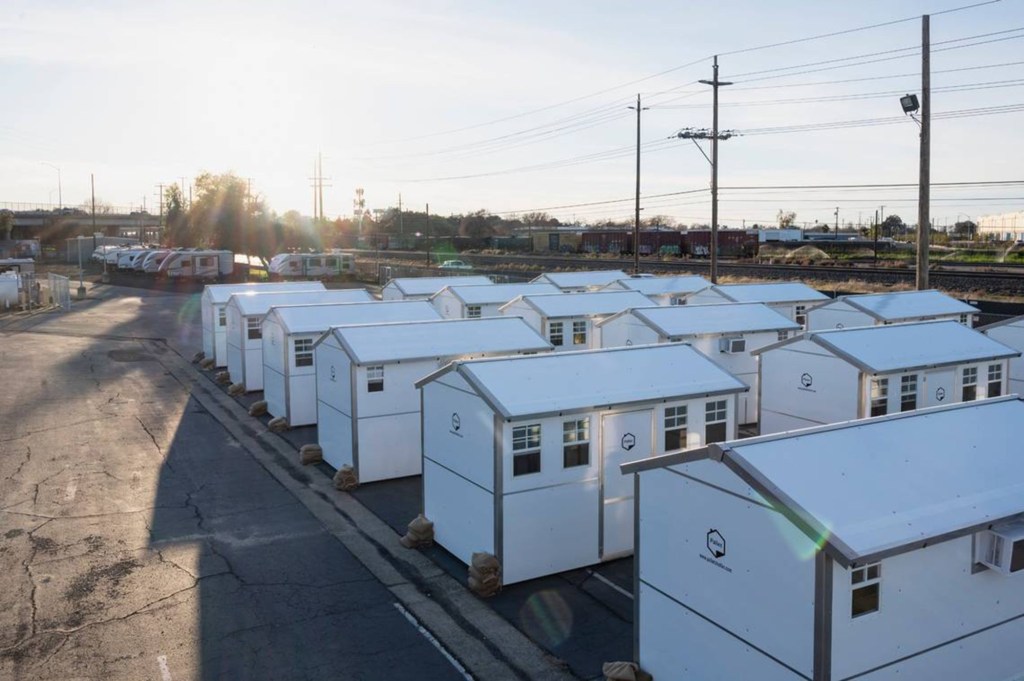San Diego County will begin negotiating with the state to buy land that can host a new homeless shelter after the federal government derailed an earlier effort to lease the property.
County officials have long hoped to construct around 60 tiny homes for homeless residents in an area of Lemon Grove owned by the California Department of Transportation, or Caltrans. But the Federal Highway Administration recently blocked Caltrans’ proposed lease for unclear reasons.
In response, the San Diego County Board of Supervisors voted 4-1 Tuesday to begin the process of purchasing the plot at 2800 Sweetwater Road.
“This is, in my opinion, a moral responsibility,” Supervisor Monica Montgomery Steppe said from the dais. “We have to implement solutions like interim emergency housing.”
The property is expected to cost about $2 million. That’s a significant jump from the original price of $1 a month, which is what the Caltrans lease was going to require, a county spokesperson previously said.
It’s somewhat of a mystery as to why the federal government opposed that deal. Montgomery Steppe said the lease hadn’t faced objections from the Biden Administration but hit a roadblock under President Donald Trump, with the Federal Highway Administration allegedly telling Caltrans that the property was “excess land” that needed to be sold.
Representatives for the highway administration have so far not answered questions from The San Diego Union-Tribune about why they blocked the lease.
A few people who spoke during Tuesday’s public meeting defended the tiny homes, which are also known as the Troy Street sleeping cabins. Montgomery Steppe brought up the recent death of Irma Perez Espinoza, a 43-year-old homeless woman found in a Lemon Grove ditch, to make the case that more shelter could save lives. Lemon Grove Mayor Alysson Snow added that “the magnitude of the problem is only growing.”
Yet a large majority of the approximately 20 people who showed up or called in, as well as the 80-plus written comments submitted to county leaders, were vehemently opposed. Some residents are particularly concerned about the fact that those living in the cabins could still be struggling with mental illnesses or substance use disorders, and the crowd included former Lemon Grove Councilmember Liana LeBaron as well as two current members of the City Council, Yadira Altamirano and Jessyka Heredia.
“Our small and underserved community is not equipped to absorb the impacts of this project,” Heredia told the board, and she added that an early childhood education center was opening up in the same area.
Those worries ultimately swayed Supervisor Jim Desmond, who cast the lone “no” vote against the measure. “I’d rather see these monies and dollars go to treatment facilities where people have to be in treatment,” he said.
Once a contract is negotiated, the board must vote again to approve the purchase. Any agreement will include a requirement that the land be used for “public purposes” for at least 15 years, according to county staffers.
The federal government is also going to have a say in that contract. If the highway administration again intervenes and stops the sale, Caltrans will have to auction off the land, local officials said.
The soonest the project should break ground in Lemon Grove appears to be summer 2026, with a possible launch the year after.
County staffers have said the cabins would come with 24 hour security and access to behavioral health services. Drugs and alcohol are to be banned on site.
Staff writer Lucas Robinson contributed to this report.

